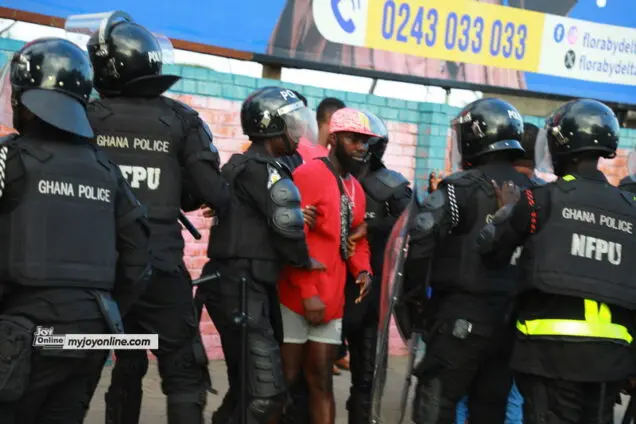The counsel for 46 Stop Galamsey protesters who were arrested during their recent protest, has criticised the actions of the Ghana Police Service, accusing them of acting in bad faith and violating the rights of the protesters.
Speaking on Joy News’ PM Express on Tuesday, Prince Ganaku expressed frustration over the police’s handling of the protest and how it undermined the very essence of the law they claim to enforce.
“This is not about enforcing the law. It has never been about enforcing the law,” he stated.
He raised concerns about the police’s decision to secure an ex parte injunction just two days before the protest, despite having received notification months in advance.
“If they were acting in good faith, they would have gone to court three months ago. What they chose to do was wait, act in bad faith, and go to court two days before the protest to get an ex parte injunction.”
Mr Ganaku highlighted the tactics employed by the police, particularly in denying the protesters access to legal representation.
“The police take the protesters, drive around with them, win, turn around, and come back. You ask where the protesters are, and they don’t let you see them.
“Lawyers have gone to the police station to see their clients, and there’s an order from above that nobody should be allowed to see anybody,” he explained, criticising the police for playing a cat-and-mouse game with the legal process.
The lawyer also condemned the police for abusing their power and acting as though they were above the law.
“If I should mention the institution that abuses their power in this country, you know who comes to mind? It is the Ghana Police Service. So this is not about enforcing the law because there is nobody more lawless than the Ghana Police Service.”
Prince Ganaku’s concern goes beyond the actions of the police, as he pointed to the complicity of the courts in the matter.
“The courts are, in a sense, complicit in endorsing the tactics of the police. The Supreme Court has already settled the issue of the right to protest, yet we still have the police overreaching and trying to make themselves regulators of a right that’s inherent in all of us, with the tacit and express endorsement of the court.”
He continued by stressing that the police and courts were working in concert to suppress the rights of the protesters.
“The police are behaving as though the government has entered into a joint venture with the courts to suppress protests. The people under whose authority this has gotten so bad live in mansions, their kids go to school abroad, and they have double passports. They are the new colonial masters.”
Mr Ganaku argues that the arrest of the protesters and the refusal to grant them bail is a deliberate attempt to discourage activism and silence dissenting voices.
“You don’t want a system where people internalize their frustration and feel as though the entire government machinery is against them. That is a recipe for disaster,” he warned, citing past instances in Ghana’s history where military interventions were preceded by a “culture of silence.”
In his closing remarks, the lawyer expressed his commitment to defending the protesters and ensuring their rights are upheld.
“If I have to, I will apply for a copy of the court proceedings and publish it online. Let everyone see the arguments made by both sides and draw their conclusions,” Ganaku declared, calling for transparency in the legal process.
As the fight against galamsey continues, Prince Ganaku’s sharp critique of the police and the judiciary raises important questions about the balance between maintaining order and protecting the fundamental rights of citizens.


